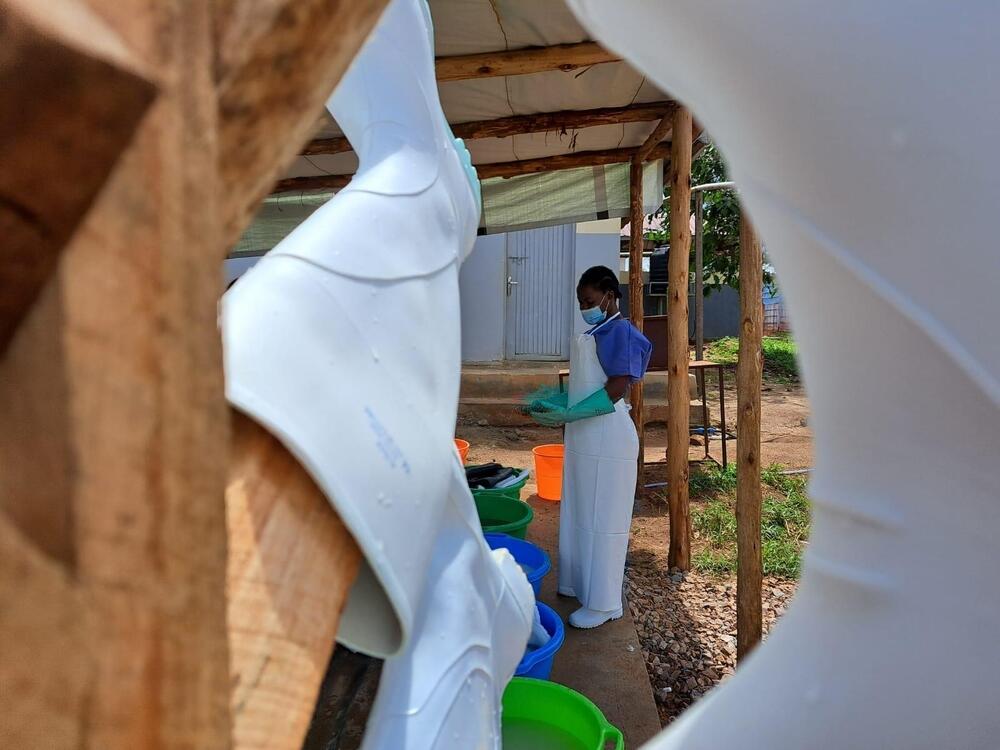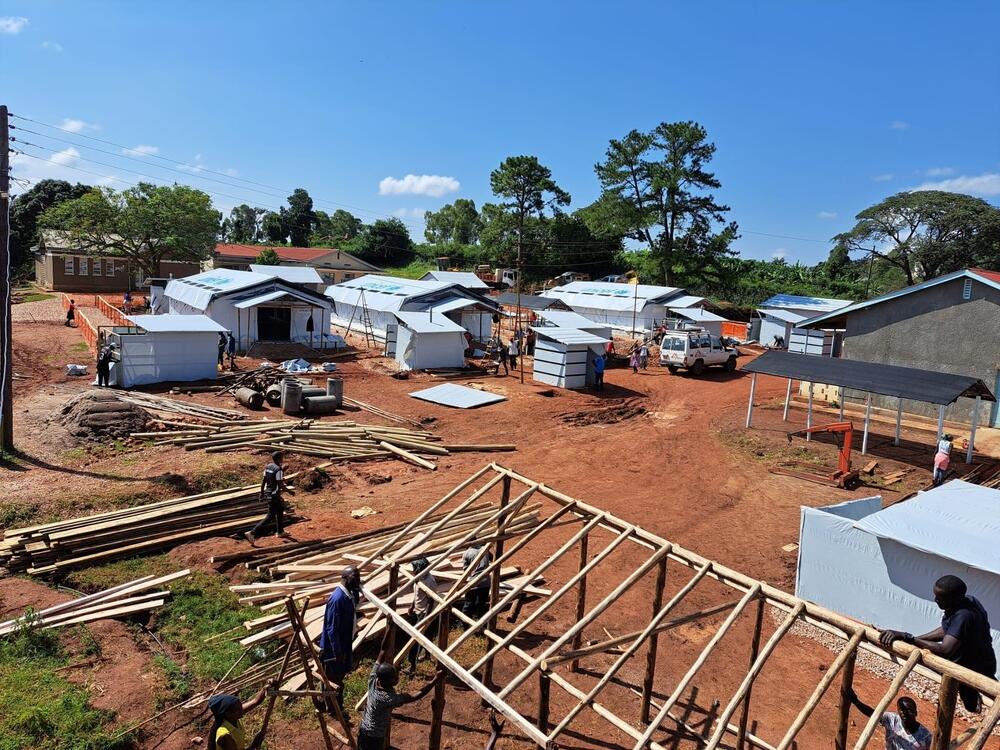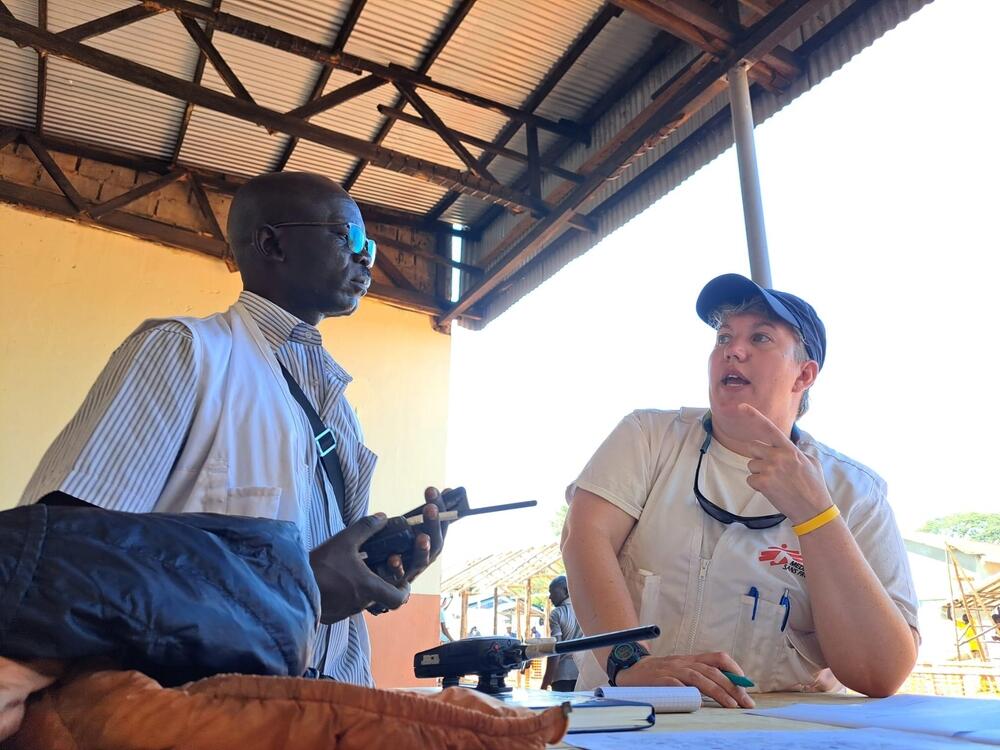Ebola in Uganda: What is MSF doing?
Since 20 September, the day that an Ebola outbreak was declared in Uganda, Médecins Sans Frontières / Doctors Without Borders (MSF) has been working to support the medical response alongside the Ministry of Health.
As of 23 October, 90 cases of Ebola have been confirmed with 28 people reported to have died from the disease. Another 32 have recovered and been discharged from treatment centres.
The outbreak is being driven by the Sudan strain of the Ebola virus. This creates a challenge as there is currently no licenced vaccines or treatment for this rarer variant. Other recent outbreaks – such as the 2014-16 West Africa outbreak – were caused by the Zaire strain.
This obstacle, combined with experience from previous Ebola outbreaks, means that MSF is focusing its response in Uganda on three key areas: community outreach, supporting medical treatment, and epidemiological work.
Teams of MSF doctors, nurses, logisticians, infection prevention and control specialists, and health promoters are currently working to limit the spread of the epidemic, reduce the death rate, and support monitoring, research, and innovation.
Working with communities
"One of the most important goals in controlling the spread of the epidemic is to reduce the time between the first symptoms of the disease and its management,” says Denis K. Mbae, an MSF outreach project coordinator.
“We know that the earlier patients are treated, the greater their chances of survival and the less risk there is of the disease spreading within the community.”
In Mubende District – the epicentre of the epidemic – several MSF teams are currently working closely with patients' communities. This includes visiting health centres or schools where Ebola patients have passed through to support prevention and infection control or to give healthcare advice.
They also provide medical and social support to people who have been forced to isolate themselves for 21 days after coming into contact with an Ebola patient – distributing basic necessities such as hygiene products, food donations, and communication equipment.
This support is intended to compensate for the loss of income and allow the person to isolate themselves in acceptable conditions.

Help us prepare for the next emergency
MSF health promoters are also involved in identifying and monitoring contacts to quickly reach those at risk of carrying the disease and to raise awareness about how to prevent it and what to do if they develop symptoms.
Finally, MSF is preparing to support healthcare centres to help them provide free frontline healthcare to communities in the areas affected by the epidemic.
Ebola treatment centres
At the same time as working with communities, MSF is supporting the Ugandan Ministry of Health in the medical treatment of sick people in Mubende district.
One 40-bed Ebola treatment centre has been completed, and another 40-bed facility, which will have the capacity to provide intensive care, is under construction in Mubende town for confirmed patients. An eight-bed treatment unit in Madudu for those in the early stages of the disease is now also up and running.
"In addition to the construction of the units, we have donated medicines and protective equipment, and provided training to medical staff working in the health facilities,” says Denis Basdevant, MSF project coordinator in Mubende.
“[This training is] on how to care for patients but also on hygiene measures to be implemented, which is crucial to avoid transmission.
“We have also provided the Ministry with MSF staff experienced in managing cases of haemorrhagic fever (like Ebola), such as doctors and nurses.”
In Kampala, Uganda’s capital, MSF will develop similar measures: health promotion activities, social support for contacts, support to healthcare facilities in terms of prevention and infection control, and support for non-Ebola-related healthcare. MSF is also expected to become directly involved in patients’ care in the near future.
Getting ahead of the virus
Finally, MSF’s epidemiological branch, Epicentre, is collaborating with the Ministry of Health on epidemiological activities, including surveillance and infection control and prevention.
MSF is also available to participate in and support research that will begin in the coming weeks on vaccines and treatments for the Sudan strain of the Ebola virus.
"The approval of effective vaccines and treatments for the Zaire strain of Ebola in 2018-2019 in the Democratic Republic of Congo (DRC) and the management of subsequent outbreaks have been crucial tools in controlling the spread of the virus,” says John Johnson, MSF's vaccine and epidemic response expert.
“We know that these can be developed and tested in advance to determine their safety, but their effectiveness can only be tested during an outbreak. As such, and as was the case with the clinical trials conducted for the Zaire strain vaccines and treatments in the DRC in 2019, MSF is prepared to invest heavily in this research."
MSF and Ebola
Ebola is one of the world’s deadliest diseases.
It is a highly infectious virus that can kill up to 90 percent of the people who catch it, causing terror among affected communities.
Ebola is so infectious that patients need to be treated in isolation by staff wearing strict protective equipment and clothing.


